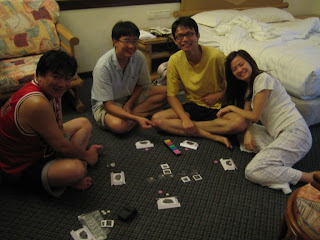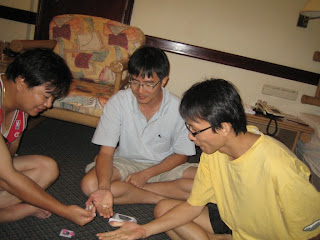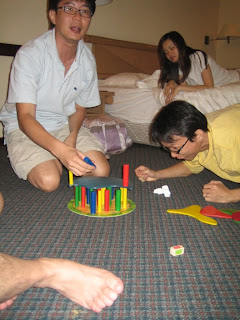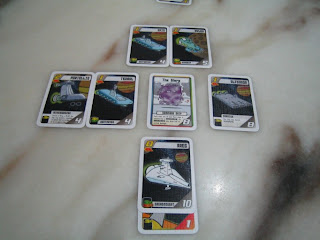I like games that make me feel that I deserved the victory (or the loss). So I guess I am on the "control" side. I tend to like games in which I feel I have choices, and my decisions have impact on whether I eventually win or lose the game. I don't like to win just because I am lucky. I want to earn my victory. And when I lose, I like to be able to look back and know what I did wrong, and to know that I could have done something to prevent the loss, or to at least to do better, whether that means winning or just ending up in a better position that where I actually was. Then I will only have myself to blame, and I will know how to improve in my next game.
Power Grid is a game which I feel has a lot of control. There are many things to consider in this game - making sure you gradually upgrade your power plants to have enough capacity, making sure you have the resources to power up your plants, making sure you have access to cities to sell your power, and amidst all that, you need to watch your finances. The phrase I use to describe why I like Power Grid is: When I lose a game, I can trace back and tell exactly what I did wrong or neglected. I feel I am in control, and thus I am responsible for my own loss (or victory). Maybe I feel this because there are so many things to do and so many factors to consider when playing the game. Does more work to do give an illusion of control? Hmm... maybe a topic for a future post...
Some people feel that sometimes winning or losing in Power Grid eventually comes down to what power plants appear near the end of the game. Some players can do everything right, but still lose because of what power plants come up. I have not experienced this and at least for now do not find this a problem. Maybe I haven't played Power Grid enough. I do remember one game against Mikko Saari, another (much more popular) boardgame blogger, on www.brettspielwelt.de, when on the last turn we bid ferociously for a power plant that both of us needed. The price went very high, and eventually he won the bid, paying a hefty price. Then the next power plant that came up (and was available only to me since he had already bought a plant that turn) was an even better one. I paid only the minimum price. At the end of that game, we could power the same number of cities, so we had to go to the tiebreaker - money. And I won because I had more money left. So, in a way, I was lucky that I gambled, hoping to get a better or comparable power plant to the one that we were fighting for, and then I did get one. I'm not sure whether Mikko felt that was a frustrating loss. But I think both of us enjoyed the game (despite playing with only 2). We enjoyed the journey, despite the ending being slightly less satisfying.
I think this is alright. We did our best to be competitive, and we remained competitive until the end. Although it was a little luck that determined the final victor, we wouldn't have got to that point if either one of us didn't play as well as the other. I had the feeling that I have done my best, and I had seen my effort translate into positive results, i.e. still remaining in the competition. So I am OK that it was a little luck at the end that tipped the scales in my favour. At least I wasn't trailing all the while, and then a stroke of luck suddenly propelled me from a bad position to victory.
The Settlers of Catan is a game with two dice. Dice = luck right? But somehow I feel that I have sufficient control in this game. With 2 dice, at least you can work out the probabilities - 2's and 12's will be rare, 7's will be most frequent. Sometimes you get lucky streaks. Sometimes you get lousy streaks. But when I play, I feel that there are things that I can do to mitigate my risks, or to maximise my chances of winning. Where to build my settlements, whether to upgrade a settlement to a city, whether to use a soldier card to send the robber away, whether to build a port settlement, whether to build roads or to start a settlement. These are decisions that I need to make. So I guess control, to me, means there are things that I can do, even if there are luck factors determing the final outcome.
There are some games which many people like, but somehow I am not as fond of as most others. I try to think of why I don't like them as much as others. One reason may be I feel I do not have enough control. These games include Ra, Citadels, and For Sale. Ra is a good game. I like it, but not as much as my friends who play it with me. This is an auction game, where over 3 rounds you collect various tiles, each having different ways of scoring. I find the theme nice, e.g. you need flooding tiles for your river tiles to be worth anything, if you have no culture tiles you get penalised, monument tiles last through all 3 rounds. The auctions are unique. You only have 3 (or 4) numbered suns per round, and you use them to bid for a set of tiles. This means you can win at most 3 (or 4) sets of tiles per round. Every time it is your turn, you only have 3 choices - add a random tile to the set, initiate an auction, or use the special power of a god tile that you have. That's simple enough. But of course at the macro level there is much more to consider. I think I feel I don't have much control because I'm just not so good at analysing and planning at the macro level. I seem to do quite poorly in Ra most of the time. Sometimes it is quite unbelievable. I can even score less than 10 points, despite having played so many times. I'm not sure whether it's because usually I play with more people, and thus have less control. It's a good game. I just suck at it.
Citadels is a game where players compete to build the most valuable city. During the course of the game, each player takes turns to secretly choose to be a character from a set of character cards. The first player to choose has the most choices. The last will have the least choices. The character you choose gives you special abilities, like stealing from another character, killing another character, swapping all cards with another player, or destroying someone else's building. In this game, often I feel I don't have enough control, especially when I keep being the victim of the thief or the assassin. The thief or assassin cannot specify which player to steal from/kill and can only specify which character to steal from/kill. So the unlucky player who chose that character will be the victim. There is some double guessing in this game. E.g. if you have many green buildings, people may think that you will choose the merchant character to earn money from those green districts, and thus they may choose to be assassin / thief and then kill / steal from the merchant. So you intentionally avoid picking the merchant. But then, maybe they'll think you won't pick the merchant because that would be so obvious. So maybe you should choose the merchant afterall. But them someone may see through your plan to take this gamble and try to kill / steal from the merchant anyway. This can go on forever. But in the end I think there is not much point to think so much. It would just make the game extremely slow (something that I have experienced and it was a pain). So, Citadels is not my type of game. There seems to be not much point in thinking too much, and it seems your best laid plans will be useless if you get unlucky (getting killed / stolen from), which is something you cannot really prevent.
For Sale is a game in which I always feel very helpless. I rarely win in this game, and I lose quite often to first time players. This is also a game about reading your group, especially in the 2nd half of the game when you need to choose your house cards simulatenously to compete for the cheques. In a way, you can say there is no luck at all, because with perfect memory you would know what house cards everyone has. So you are just guessing what card everyone will play. There is no luck, because what card to play is up to the players. Unfortunately it is usually not easy to predict what the group will do. You may hope that everyone will play low cards, so you will only need a medium low card to win the highest valued cheque. Even if most players do as you predict, if just one person decides to play a high card, you will end up with the 2nd highest valued cheque, which, sometimes can be much less than the #1 cheque. A lot of time when I play this game I feel my effort is futile. Either I also just suck at this game, or it is just too difficult to predict what a group of people will do.
In the hobby, some people define the terms "chaos", and "randomness" or "luck" very strictly. Luck/randomness is about the outcome of a die roll, what cards you draw, etc. Chaos arises out of the different decisions made by players, the different mentalities and playing styles of the players. Usually the more players, the more chaos. Some games are more chaotic than others. Drawing a bad event tile in Lord of the Rings is (bad) luck. Getting numbers that are clumped together in Category 5 is (usually bad) luck, but what cards are chosen and played by each player is chaos (although they are constrained by what cards they get too). Whether anyone will veto a character in King Me is definitely chaos. There were times when noone was willing to spend their veto card when the first character was proposed to be king, hoping that other players would do it, resulting in the first proposed character to become king. That made a very short round indeed.
I find that I am actually more comfortable with luck than chaos. With luck, at least I know there is nothing at all I can do. Or sometimes I can at least accurately calculate the probabilities, and then act accordingly. Being able to calculate the probabilities does not mean being able to predict the outcome, but it gives me a feeling of control. With chaos, it just seems futile. The human mind has too many possibilities. I feel helpless. I don't have enough information to make a decision I'm confident about. Maybe this is because of my job as a manager. I always try to get enough information to make the right decisions, and I always try to be in control of the situation.
There are perfect-information games that can be quite chaotic too. Through the Desert is a game that I like a lot, but at times it can be a little chaotic too, especially when played with more players. At times, it is possible that all the other players happen to be competing with all five of your caravans, and your caravans are, unfortunately being cut off from oases, or hemmed in by one or more opponents. And there is not much you can do. Well, perhaps you could have placed your caravans in less competitive locations during the game setup, but that is not always possible especially with more players. Generally when I play Through the Desert it is not chaotic, and I feel I have full control. The decision angst comes from deciding which caravan to expand. But sometimes chaos happens.
One game in which I do not have much control, but still enjoy is Pickomino. This is a dice game. There is some decision making and risk taking, but also a lot of luck. But maybe the game is short, and the theme of chicken fighting over BBQ worms is just so silly, and due to the excitement of dice rolling, I find the game enjoyable and don't really mind the lack of control. But when I look through the list of games that I own and like, I realise that there are very few games that I like that have little control. So, maybe I am a control freak.
What about fun? Often when boardgame hobbyists discuss deep topics at www.boardgamegeek.com, eventually this question will be raised. So what? It doesn't matter as long the game is fun, right? There are some games where the lack of control makes things fun. It is something to laugh about. For me, most of the time, fun means investing effort and time (in a game), and seeing my effort come into fruitation, and seeing my strategy and (good) planning earn me victory. So, I am on the "control" side, and "control" means meaningful decisions, and that you have to think and work for your win.










